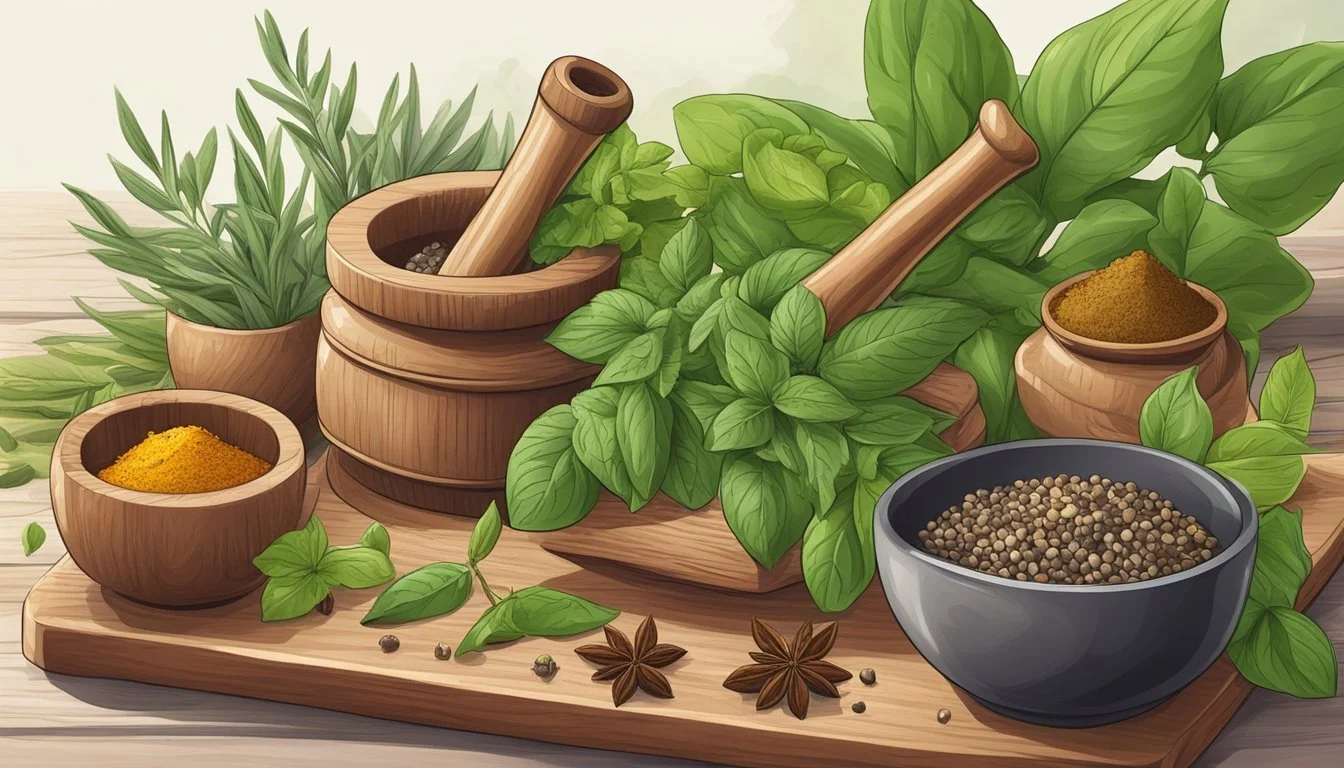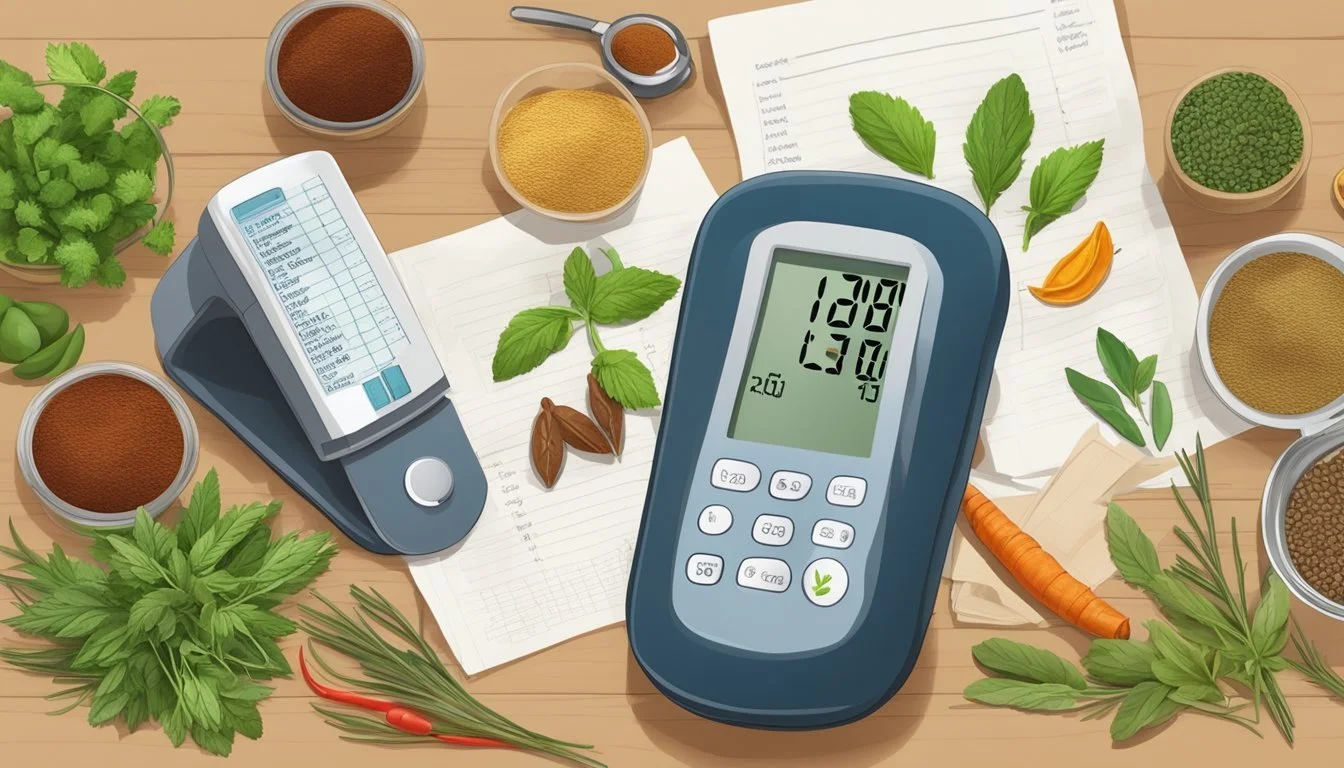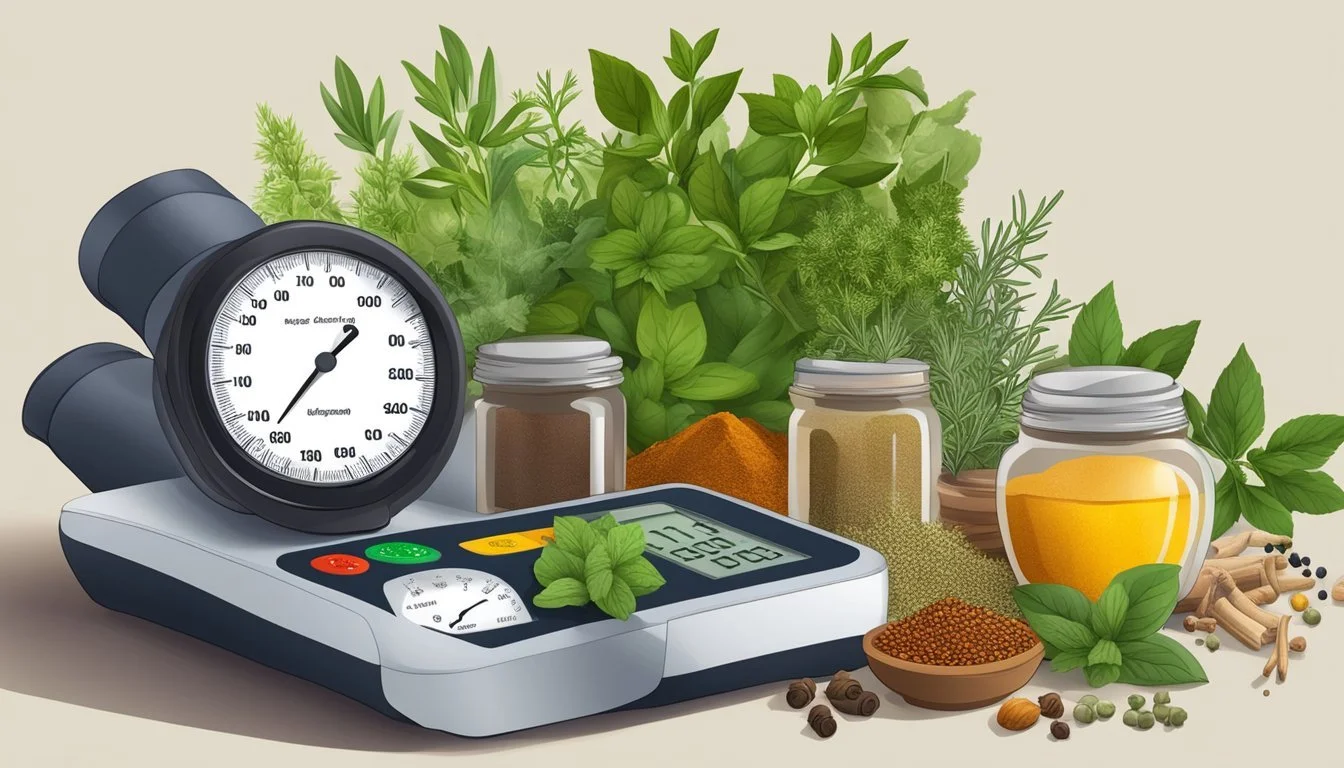Are There Any Herbs or Spices That Can Help Lower Blood Pressure?
Unveiling Natural Hypertension Remedies
High blood pressure is a common health concern that affects millions worldwide. Managing it is crucial because it’s often linked to an increased risk of heart disease and stroke. Traditional medication is the cornerstone of treatment, yet many individuals also turn to dietary and lifestyle changes to help control their blood pressure levels.
Research indicates that certain herbs and spices may support healthy blood pressure levels. For instance, garlic has been noted for its potential to relax blood vessels, which can lead to reduced pressure. The compound allicin, found in garlic, is thought to play a role in this effect. Similarly, other botanicals like parsley, basil, and celery seeds are suggested to have beneficial properties that might assist in managing hypertension.
With a growing interest in holistic and natural remedies, understanding which herbs and spices may contribute to lowering blood pressure is valuable. It provides options for those seeking to complement their medical treatment with alternative approaches. However, it is imperative to consult healthcare professionals before making any significant changes to health regimens.
Understanding Blood Pressure
Blood pressure is a crucial indicator of cardiovascular health, reflecting the force exerted by circulating blood upon the walls of the blood vessels. It's a key factor in diagnosing and managing conditions such as hypertension, which can lead to heart disease if not properly monitored and controlled.
What Is Systolic and Diastolic Blood Pressure
Systolic blood pressure is the pressure exerted when the heart beats, pumping blood through the arteries. It represents the upper number in a blood pressure reading. Diastolic blood pressure, represented as the lower number, measures the pressure in the arteries when the heart rests between beats.
Normal Blood Pressure: Systolic <120 mmHg and Diastolic <80 mmHg
Elevated Blood Pressure: Systolic 120–129 mmHg and Diastolic <80 mmHg
Hypertension Stage 1: Systolic 130–139 mmHg or Diastolic 80–89 mmHg
Hypertension Stage 2: Systolic ≥140 mmHg or Diastolic ≥90 mmHg
The Role of Blood Vessels and Blood Flow
Blood vessels are integral to the circulatory system. Healthy arteries are elastic and strong, but high blood pressure can damage them over time. When blood vessels become less flexible, it forces the heart to pump harder, raising blood pressure levels further and potentially causing hypertension. Maintaining the health of blood vessels is essential for preventing heart disease and other cardiovascular issues.
Factors Influencing Blood Pressure
Blood pressure is affected by various factors, ranging from lifestyle choices to medication interactions. Understanding these influences is crucial in managing and potentially lowering high blood pressure.
Importance of Lifestyle Changes
Lifestyle changes play a pivotal role in the management of blood pressure. Key changes include:
Diet: Adopting a healthy diet rich in fruits, vegetables, lean proteins, and whole grains while low in saturated fats and salt can help manage blood pressure.
Exercise: Regular physical activity helps the heart use oxygen more efficiently, often resulting in lower blood pressure.
Stress: Chronic stress may contribute to high blood pressure, so finding stress reduction techniques is important for overall cardiovascular health.
Interaction with Medications
Medications prescribed to lower blood pressure can interact with other drugs, supplements, or even natural remedies like herbs. It is crucial for individuals to:
Communicate: Share with healthcare providers about any herbs or supplements they are taking, as these can alter the effectiveness of blood pressure medications.
Understand: Be aware of the potential interactions between blood pressure medications and other prescriptions or over-the-counter drugs to avoid adverse reactions.
Herbal Remedies for Hypertension
A range of herbs and spices may contribute to better blood pressure management. The use of such natural remedies has garnered attention for their potential roles in lowering blood pressure without the heavy reliance on pharmaceuticals.
Potential Herbs for Lowering Blood Pressure
Garlic (Allium sativum): Often used for its flavor-enhancing properties, garlic may also have health benefits. It contains allicin, a compound which is believed to help relax blood vessels and improve circulation, potentially leading to lower blood pressure.
Hibiscus (Hibiscus sabdariffa): Hibiscus tea is noted for its vibrant color and tart flavor, but studies suggest it may also help reduce both systolic and diastolic blood pressure.
Green Tea (Camellia sinensis): Green tea is associated with a wide array of health benefits, including possible blood pressure reduction due to its polyphenols and catechins.
Celery Seed (Apium graveolens): This spice comes from the celery plant and is commonly used in medicine to address hypertension, among other conditions.
Basil (Ocimum basilicum): An herb frequently found in kitchens, some studies show that basil may help with cardiovascular health, including blood pressure control.
Spices That May Affect Blood Pressure
Turmeric (Curcuma longa): Known for its bright yellow color and association with curries, turmeric contains curcumin, which may support a decrease in inflammation and blood pressure.
Ginger (Zingiber officinale): Beyond its culinary appeal, ginger may assist in cardiovascular health by aiding blood vessel dilation.
Oregano (Origanum vulgare): This common kitchen herb contains carvacrol, a substance that has been shown to affect blood pressure positively.
Thyme (Thymus vulgaris): Thyme's constituents, such as rosmarinic acid, have been linked to antihypertensive effects in animal studies.
Parsley (Petroselinum crispum): Often used as a garnish, parsley may have diuretic properties that can play a role in blood pressure regulation.
Cardamom (Elettaria cardamomum): This aromatic spice is suggested to have blood pressure-lowering properties, making it of interest for those managing hypertension.
Scientific Evidence
Research on herbs and spices often explores their potential health benefits, including their ability to affect blood pressure levels. Clinical studies and animal research provide evidence for these effects, examining active compounds, dosages, and mechanisms of action.
Clinical Studies on Herbs and Spices
Clinical research involving randomized, placebo-controlled trials serves as a strong foundation for evaluating the efficacy of herbs and spices in lowering blood pressure. One notable example is the study of resveratrol, an extract found in grapes, which has demonstrated a significant antihypertensive effect in various dosages. Another substance, pycnogenol, derived from pine bark, also shows promising results but its effectiveness hinges on specific dosages and administration frequency. Beetroot juice and certain extracts like that of olive leaf, containing oleuropein, have been studied for their vasodilatory properties, indicating a potential to lower systolic and diastolic blood pressure.
Resveratrol: Effective at various doses
Pycnogenol: Dose and frequency are crucial for its effectiveness
Beetroot Juice: Influences mainly systolic blood pressure
Olive Leaf Extract: May lower both systolic and diastolic blood pressure
Animal Studies and Their Implications
Animal studies contribute to the understanding of how certain herbs and spices may impact human health, often preceding clinical trials. They help identify active components and suggest mechanisms by which these substances exert their effects on blood pressure. For example, allicin, a compound in garlic, has been found to relax blood vessels in animals, which may imply similar benefits in humans. These studies are instrumental in advancing knowledge on the optimal extract concentrations and dosage before progressing to human trials.
Allicin in Garlic: Poses potential vascular benefits
Ginger Extract: Suggested to act similarly to blood-pressure-lowering medications in doses of at least 3 grams per day
This section indicates a landscape of evidence, with various herbs and spices backed by scientific research demonstrating their potential to contribute to blood pressure management.
Blood Pressure and Diet
Dietary choices significantly affect blood pressure levels. This section explores how nutrition can influence blood pressure and discusses the comparison between using supplements and whole foods as methods to manage blood pressure.
The Impact of Nutrition on Blood Pressure
Nutrition plays a pivotal role in the management of blood pressure. A healthy diet that includes a variety of fruits, vegetables, whole grains, legumes, seeds, and nuts can contribute to lower blood pressure levels. These foods are rich in essential nutrients like potassium, magnesium, and calcium, which are known to help reduce blood pressure. Fiber from whole foods also aids in this process, as it helps to improve overall cardiovascular health.
Notably, reducing sodium intake is crucial for individuals looking to manage their blood pressure. Foods high in antioxidants and polyphenols, such as berries and leafy greens, have been found to support vascular health. Additionally, omega-3 fatty acids, commonly found in fish and flaxseeds, are associated with beneficial effects on blood pressure. It's important to prioritize a balanced intake of these nutrients through a varied diet.
Supplements vs. Whole Foods for Blood Pressure
When considering supplements versus whole foods for blood pressure management, whole foods offer a complex matrix of nutrients and health benefits that supplements typically cannot match. Whole foods provide a synergistic combination of vitamins, minerals, and other beneficial compounds like fiber and polyphenols that work together to support healthy blood pressure levels.
While certain supplements can be effective for targeted needs, they should not replace the variety and balance afforded by a diet rich in whole foods. For example, garlic supplements are recognized for their potential to mimic the blood pressure-lowering effects of some medications, containing compounds that can relax blood vessels and improve circulation. However, they may lack the additional health benefits that come from consuming whole garlic as part of a broader dietary approach. Therefore, it's advisable to seek nutrients from a diet centered around whole foods, using supplements as complementary under professional guidance.
Additional Factors Affecting Blood Pressure
In the discussion surrounding blood pressure management, it is crucial to recognize that lifestyle and behavior play significant roles. Specifically, stress and physical activity levels heavily influence blood pressure outcomes.
Stress and Blood Pressure
Stress significantly impacts blood pressure, as it triggers the release of hormones like adrenaline and cortisol that temporarily increase blood pressure by causing the heart to beat faster and blood vessels to narrow. Chronic stress may lead to sustained periods of high blood pressure and is associated with unhealthy habits such as poor diet and increased alcohol consumption.
Short-term stress: Sudden spikes in blood pressure due to acute stress.
Chronic stress: A possible cause for sustained high blood pressure.
Managing stress effectively through relaxation techniques, time management, and counseling can help to control blood pressure levels.
Physical Activity and Cardiovascular Health
Physical activity is a cornerstone of cardiovascular health and is essential for managing blood pressure. Regular exercise strengthens the heart, allowing it to pump blood with less effort, which in turn reduces pressure on the arteries, leading to lower blood pressure.
Aerobic exercise: Activities such as walking, jogging, cycling, or swimming that improve cardiovascular health.
Strength training: Helps in maintaining lean muscle mass and supports metabolism.
Incorporating at least 150 minutes of moderate-intensity exercise per week can result in significant health benefits, including weight loss and improved mental health. A combination of regular physical activity and other lifestyle changes boosts overall health and acts as preventive care against hypertension.
Consulting Healthcare Providers
Before incorporating herbs and spices into one's diet for blood pressure management, it is crucial to consult healthcare providers, especially when individuals are on medications or have a medical history of cardiovascular disease.
When to Speak to a Healthcare Provider
Patients should schedule a discussion with their healthcare provider when considering the use of herbs and spices as adjunctive treatments for high blood pressure. This is particularly important if the individual:
Is currently taking prescription medications for hypertension or other conditions, as there may be interactions.
Has a medical history involving heart attacks, stroke, or other cardiovascular issues.
Experiences changes in blood pressure readings, whether elevated or below normal blood pressure, which is typically less than 120/80 mmHg.
Monitoring Blood Pressure
Blood pressure should be routinely measured to ensure it remains within the normal range and to identify any potentially dangerous elevations. Healthcare providers can support patients in:
Establishing baseline blood pressure readings.
Determining how frequently blood pressure should be monitored.
Interpreting the results within the context of other risk factors for heart disease.
It is important to remember that elevated blood pressure is a significant preventable risk factor for heart attack, stroke, and premature death. Regular monitoring helps in the prompt detection and management of changes in blood pressure, whether through lifestyle adjustments or medications.
Conclusion
In the management of high blood pressure, incorporating certain herbs and spices into one's diet may offer a supportive role alongside lifestyle modifications and medication. Garlic stands out for its sulfur-containing compounds, such as allicin, which are observed to relax blood vessels and improve circulation.
Studies highlight a selection of these beneficial herbs and spices:
Basil and parsley are noted for their potential effects on blood pressure.
Celery seeds are another option, containing active compounds that may promote cardiovascular health.
The traditional use of Chinese cat's claw has garnered attention for its possible blood pressure-lowering properties.
Ginger, consumed at a minimum quantity of 3 grams per day, is suggested to provide a meaningful reduction in blood pressure levels.
Cinnamon, turmeric, and oregano have also been recognized; these spices may contribute to lower blood pressure measurements.
It is crucial for individuals considering these dietary additions to consult with a healthcare professional. This ensures that any natural supplements or herbs are consumed safely and do not interact adversely with prescribed medications.
A balanced approach, prioritizing a healthy diet, consistent exercise, and stress management, should always serve as the foundation for controlling blood pressure. Herbs and spices can be part of this comprehensive strategy, offering flavor and potential health benefits to those managing hypertension.




